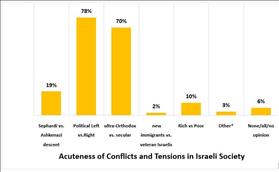Strengthening Religious Freedom
New Religion and State Index 2023: Acute Tension Between ultra-Orthodox and Secular Jews
The tension between ultra-Orthodox and secular Jews and between the political right and the left are the most significant internal conflicts in Israel, far more than other internal tensions that tore Israeli society apart in the past
13/09/2023 12:06
Tags: ultra-Orthodox · Religion and State Index · Hiddush

Acuteness of Conflicts and Tensions in Israeli Society
This week, as in every year since Hiddush’s founding in 2009, on the eve of Rosh HaShanah we published our annual unique 15th Israel Religion and State Index. The Index is the only systematic and in-depth periodic review of its kind of the positions of the adult Jewish public in Israel on matters of religion and the state. It presents a comprehensive picture of all the controversial issues in these areas, analysing a variety of social, political, and religious intersections and enabling us to observe how these positions have developed over time.
The findings of the Religion and State Index once again illustrate how far the positions of the majority of the Jewish public on matters of religion and state are from those of the politicians who claim to be representing them, on issues such as the conscription of Yeshiva students to the military, public transportation on Shabbat, state funding for yeshivas, freedom of marriage, enforcing core curricular studies in ultra-Orthodox schools and more.
Israeli society is characterized by many internal tensions and conflicts. We asked the survey participants: Which of these tensions is the most acute in your opinion? And what is the second-most-acute tension?
70% of the adult Jewish public maintained that the most acute [or second most acute] internal tension in Israel at the current time is between ultra-Orthodox and secular Jews. This represents an increase of 10% in comparison with last year's findings.
The tension between ultra-Orthodox and secular Jews and between the political right and the left are the most significant internal conflicts in Israel, in the opinion of the adult Jewish public, far more than other internal tensions that tore Israeli society apart in the past. In recent years, the tension between the political right and the left has escalated and is slightly higher than tensions between the secular and the ultra-Orthodox. Consistently, this year included, the tension between Mizrahi Jews (“Eastern” or Oriental Jews originally from the Middle East, North Africa and Central Asia) and Ashkenazi Jews (of Western and Eastern European descent) is significantly and consistently low, contrary to claims prevalent in the media, social networks and those with a political interest in inflaming ethnic tensions.
78% of the public supports the conscription of yeshiva students to the IDF
As to the often-debated question regarding the involvement of diaspora Jewry in the battles over religious freedom and pluralism in Israel, while Israeli Jews mostly object to Diaspora involvement on issues of security, borders, etc., on matters of religion and the state the findings are the opposite: 62% favour the engagement of Diaspora Jewish organizations in strengthening religious freedom and pluralism in Israel.
A majority of 78% of the public supports the conscription of yeshiva students to the IDF, either all of them (like other Jewish youth) or by setting an annual quota of exemptions for outstanding students and drafting the rest.
71% support the operation of public transportation on Shabbat. This percentage includes not only a huge majority of the secular public (96%) but also the majority of those who identify as traditional and even 30% (approximately) of the religious public. Among the supporters of public transportation on Shabbat are 64% of Likud voters and 83% of those who have not yet decided on how they will vote in the next elections.
These are some of the many important findings of the Israel Religion and State 2023 Index released this week by Hiddush - for Religious Freedom and Equality. (A translation of the report in English will be available after the holiday).
For years, Hiddush’s Religion and State Index has demonstrated that the majority of the public supports the full implementation of the Declaration of Independence's assurance of freedom of religion and equality. The findings of the current Index are of particular importance because they Illustrate the deepening tension among the public on issues relating to religion and state. We have no doubt that this fact will be reflected in the upcoming municipal elections in October, and also in the next Knesset elections. The public rightly associates the “legal overhaul” with the growing appetite and pressure of the religious parties - and resents it. In the political arena there will be parties that understand the public's wishes to see a government that does not submit to the dictates of the ultra-Orthodox parties.
As harsh as the reality in Israel today is, the findings of the Index encourage us to believe that in the eye of the storm lies hope for a better (and not too distant) future.
See also the Jerusalem Post article about the Index.